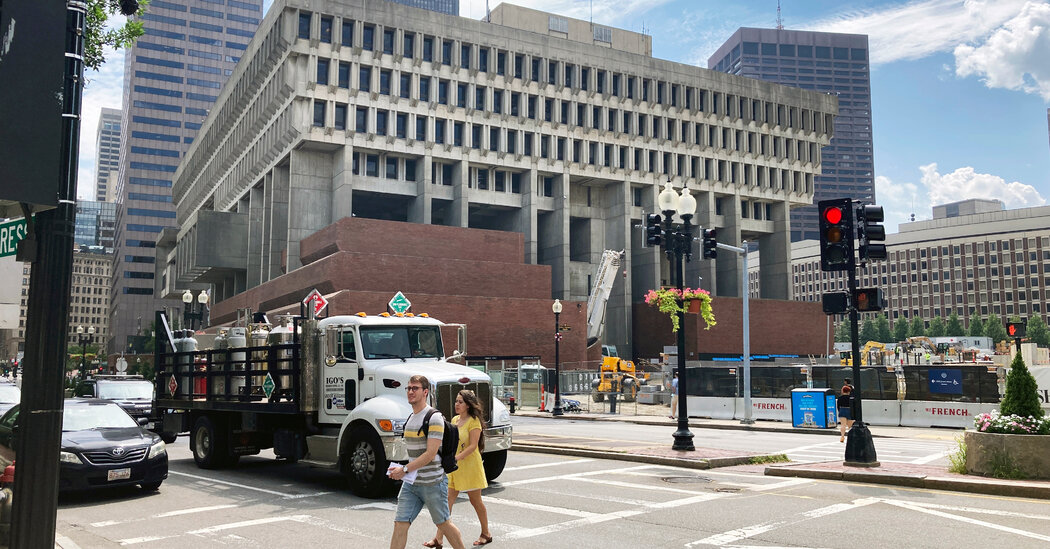The court seemed poised to rule that the city, which has approved many other requests to raise flags at its City Hall, violated a Christian group’s free speech rights.
WASHINGTON — The City of Boston, which refused to let a private group raise a Christian flag in front of its City Hall, seemed to be headed for a loss after a Supreme Court argument on Tuesday.
Justices across the ideological spectrum, noting that the city had approved many similar requests from organizations seeking to celebrate their backgrounds or to promote causes like gay pride, seemed ready to rule that the city had violated the free speech rights of Camp Constitution, which says it seeks “to enhance understanding of our Judeo-Christian moral heritage.”
The group’s application said it sought to raise a “Christian flag” for one hour at an event that would include “short speeches by some local clergy focusing on Boston’s history.” The flag bore the Latin cross.
The city, which had granted 284 requests to raise flags in connection with many kinds of events over a 12-year period, rejected the application, saying that flying the flag would amount to government endorsement of religion. Camp Constitution sued, arguing that the decision violated its right to free speech.
As the argument reached its conclusion, Justice Elena Kagan said the city had made an understandable mistake in relying on the part of the First Amendment that prohibits government establishment of religion when it should have been focusing on its free speech clause. Putting a permanent cross on the roof of City Hall would violate the establishment clause, she said, but banning a religious group from conveying its message in a transient setting open to lots of speakers violates the amendment’s guarantee of freedom of speech.
The central question in the case, Shurtleff v. City of Boston, No. 20-1800, was whether the city had created a public forum by allowing private groups to use its flagpole or whether it was conveying its own speech by choosing and endorsing the flags it approved. When the government is speaking for itself, it is immune from First Amendment scrutiny.
Sopan Joshi, a lawyer for the federal government arguing in support of Camp Constitution, said that “it can be a really fine line between the government soliciting messages from third parties to help shape its own message on the one hand and serving as a conduit for the third parties to express their own messages on the other.”
He said the flag program in Boston had created a public forum in light of the number of flags approved and the cursory review most applications received. He used an analogy: Government speech is like a curated symposium, while a public forum is like an open-mic night.
A unanimous three-judge panel of the United States Court of Appeals for the First Circuit, in Boston, ruled for the city, largely on the ground that the government is entitled to choose the messages it endorses.
Even as the Supreme Court seemed poised to reject the view that the hundreds of flags the city had allowed were all government speech, some justices worried about the consequences of a broad ruling, asking, for instance, whether the city would have to fly a flag bearing a swastika.
Mathew Staver, a lawyer for Camp Constitution, said yes. He added that “an informed observer” familiar with the city’s flag program and its history would know that the flags flown on the third flagpole represented private speech.
That assertion met a skeptical response.
Such an observer must be “very informed,” Justice Kagan said. As for the more typical ones, she said, “all they know is: ‘I’ve seen the City of Boston flag here a thousand times, and now I see another flag. It must be the City of Boston decided to do something else today.’”
Douglas Hallward-Driemeier, a lawyer for Boston, said there were limits to what the city must be made to allow. “Private parties are free to wave their flags on City Hall Plaza or even raise a temporary flagpole there,” he said, “but they cannot commandeer the city’s flagpole to send a message the city does not endorse.”
The solution, some justices suggested, was for the city to exercise more control over the process, so that it would be plain that it was endorsing the messages the flags conveyed.
Justice Amy Coney Barrett sketched out what such an approach might include.
“The City of Boston sits down, asks what’s going to be expressed and says, ‘Yes, this is an idea that Boston can get behind,’” she said. “And a government official participates in the flag raising, participates in the ceremony, communicating that, ‘Yes, Boston is happy to celebrate and communicate pride in Juneteenth, but, no, Boston is not going to participate in a flag raising for the Proud Boys.’”


























